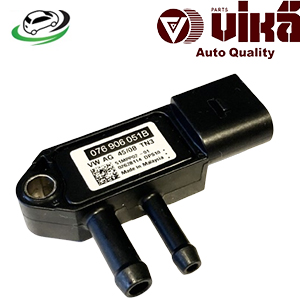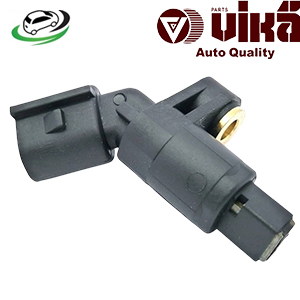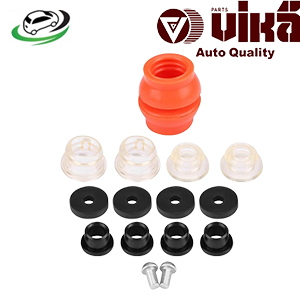-19%
Get VW Golf II (19E 1G1)/ Golf III (1H1)/ Golf III Variant (1H5)/ Golf III Cabriolet (1E7) Gear Change Linkage Bush Kit 191798211S
The gear change linkage bush kit is a crucial component in manual transmission vehicles, contributing significantly to smooth gear shifting. Over time, wear and tear on bushings can lead to sloppy or unresponsive gear shifts. By installing a gear change linkage bush kit, drivers can restore the precise and crisp gear shifting experience that was intended when the vehicle was new. This guide delves into the role of a gear change linkage bush kit, how it works, its benefits, common issues, and maintenance tips, providing a comprehensive understanding for both professionals and vehicle owners.
1. What is a Gear Change Linkage Bush Kit?
A gear change linkage bush kit includes a set of bushings that are designed to replace worn-out or degraded bushings within the gear shift linkage assembly. These bushings act as cushions between the metal components of the gear linkage, reducing friction and wear while allowing smooth movement. The linkage itself is the system that connects the gear lever (shifter) to the transmission, enabling the driver to select different gears.
In manual transmission systems, the shifter must engage with the correct linkage rods and levers to change gears. The bushings facilitate this process by ensuring smooth transitions between gears. The bush kit is typically made from high-strength materials like rubber, polyurethane, or metal, chosen for their durability and resistance to wear.
2. How Does a Gear Change Linkage Bush Kit Work?
The gear linkage system in a manual transmission vehicle consists of rods, levers, and pivots that connect the gear lever to the transmission’s gear selector. The bushings within this system provide a cushion between these metal components, ensuring that movement is smooth and not hindered by friction or excessive play. Over time, these bushings can wear out, become brittle, or disintegrate, leading to imprecise shifting or a “loose” feeling in the gear lever.
a. Bushings as Friction Reducers
The primary function of the bushings is to reduce metal-to-metal contact between the various moving parts in the linkage system. By doing so, they prevent excessive wear and tear on these components, ensuring the longevity of the gear linkage system.
b. Maintaining Proper Alignment
The bushings also play a vital role in maintaining the correct alignment of the linkage system. Without properly functioning bushings, the linkage rods and levers can become misaligned, resulting in difficulty engaging the desired gear.
c. Absorbing Vibrations
Another key function of the bushings is to absorb vibrations from the engine and transmission, which could otherwise be transmitted to the gear lever. By cushioning these vibrations, the bushings enhance the overall driving experience, making gear shifts feel smoother and more refined.
3. Importance of a Gear Change Linkage Bush Kit
A gear change linkage bush kit is crucial for the proper functioning of the transmission system. Here’s why:
a. Restores Precision in Gear Shifting
As bushings wear out, the precision of gear shifts is compromised. The gear lever may feel sloppy, making it difficult to engage the correct gear quickly or smoothly. Replacing the worn bushings with a new bush kit restores the precise feel of the gear lever, enhancing driving comfort.
b. Prevents Transmission Damage
Worn or missing bushings can lead to misalignment within the gear linkage system. This misalignment can result in the gears not fully engaging, which can cause wear on the transmission’s internal components and lead to expensive repairs. A functioning bush kit ensures the gear linkage remains aligned and operates correctly.
c. Improves Overall Vehicle Performance
Smooth gear shifts contribute to overall vehicle performance. A properly functioning gear linkage system allows the driver to change gears quickly and accurately, improving the vehicle’s responsiveness, especially in performance-oriented or manual-driving scenarios.
4. Common Signs of Worn Gear Linkage Bushings
Worn or damaged gear linkage bushings can affect vehicle performance in various ways. Some of the common symptoms of faulty bushings include:
a. Sloppy Gear Shifts
One of the most obvious signs of worn bushings is a sloppy or loose gear lever. If the gear lever feels loose or wobbles excessively, this is often due to degraded bushings that no longer hold the linkage rods in place.
b. Difficulty Engaging Gears
If you’re experiencing difficulty selecting or engaging certain gears, particularly reverse or first gear, it may be a sign that the bushings are worn and the linkage is no longer properly aligned.
c. Unusual Noises During Shifting
A common symptom of worn bushings is noise when changing gears. Clicking, clunking, or grinding sounds during gear shifts can indicate that the bushings are no longer cushioning the components effectively.
d. Increased Vibrations in the Gear Lever
As the bushings degrade, they lose their ability to absorb vibrations from the engine and transmission. This can result in increased vibrations being felt in the gear lever, making shifting less smooth and more uncomfortable.
5. Benefits of Installing a New Gear Change Linkage Bush Kit
Installing a new gear change linkage bush kit offers a range of benefits, particularly for vehicles that have seen years of use and wear:
a. Enhanced Gear Shift Precision
A new set of bushings restores the original precision of the gear shift system, making the gear lever feel more responsive and allowing for smoother, more accurate shifts.
b. Improved Durability
Modern bush kits are often made from materials like polyurethane, which is more durable and resistant to wear compared to the rubber bushings originally used in many vehicles. These materials extend the life of the linkage system and reduce the need for frequent replacements.
c. Reduced Vibrations and Noise
A new bush kit effectively absorbs engine and transmission vibrations, reducing the noise and vibrations transmitted to the gear lever. This results in a quieter and more comfortable driving experience.
d. Prevention of Further Damage
Replacing worn bushings prevents misalignment and excessive play within the gear linkage system, which in turn protects the transmission from damage. This can save on costly repairs in the long run.
e. Cost-Effective Solution
Compared to the cost of repairing or replacing the entire transmission or gear linkage assembly, installing a gear change linkage bush kit is a relatively inexpensive and simple solution. It can provide a significant improvement in gear shift quality at a fraction of the cost.
6. Installation Process for a Gear Change Linkage Bush Kit
Installing a gear change linkage bush kit is a relatively straightforward process for someone with basic mechanical knowledge. Here’s a simplified guide to the installation process:
a. Tools Required
- Jack and jack stands (for elevating the vehicle)
- Socket set and ratchet
- Screwdrivers
- Pliers
- New bush kit
b. Step-by-Step Installation
- Raise the Vehicle: Using a jack and jack stands, raise the vehicle to access the underside where the gear linkage is located.
- Locate the Gear Linkage: The linkage rods will be connected to the transmission and the gear lever. Locate the bushings along the rods.
- Remove the Old Bushings: Using a socket set and screwdrivers, carefully remove the old, worn bushings from the linkage rods. Note the placement of the bushings, as you will need to install the new ones in the same position.
- Install the New Bushings: Install the new bushings from the kit into the linkage assembly, ensuring that they fit securely and are properly aligned with the rods and levers.
- Test the Gear Shift: Before lowering the vehicle, test the gear lever to ensure that the new bushings have restored smooth and precise gear shifts.
- Lower the Vehicle: Once you’re satisfied with the operation of the gear lever, lower the vehicle and take it for a test drive to confirm the installation was successful.
7. Maintenance Tips for Gear Change Linkage Bushings
Proper maintenance of the gear change linkage bushings can extend their lifespan and ensure smooth gear shifts for years to come:
a. Regular Inspection
Periodically inspect the gear linkage bushings for signs of wear or damage. Catching issues early can prevent more severe problems later on.
b. Lubrication
In some cases, applying a light lubricant to the bushings can reduce friction and prolong their life. Be sure to use a lubricant that is compatible with the materials used in the bushings.
c. Check for Alignment
Regularly check the alignment of the linkage system to ensure that the bushings are not causing any misalignment, which can lead to uneven wear and difficulty in gear shifting.
d. Replace When Necessary
If you notice any of the symptoms of worn bushings, such as sloppy gear shifts or increased noise, it’s best to replace the bushings as soon as possible to avoid further damage to the linkage system or transmission.
Conclusion
The gear change linkage bush kit plays an essential role in maintaining the smooth operation of a manual transmission system. By replacing worn or damaged bushings with a new kit, drivers can restore the precision and responsiveness of their gear shifts, prevent transmission damage, and improve the overall driving experience. Regular maintenance and timely replacement of bushings are key to ensuring the longevity of the gear linkage system and avoiding costly repairs. With this comprehensive understanding of how the gear change linkage bush kit functions, its benefits, and maintenance tips, vehicle owners can take proactive steps to keep their transmission systems operating smoothly.
Follow us on Facebook for more parts.




Reviews
Clear filtersThere are no reviews yet.